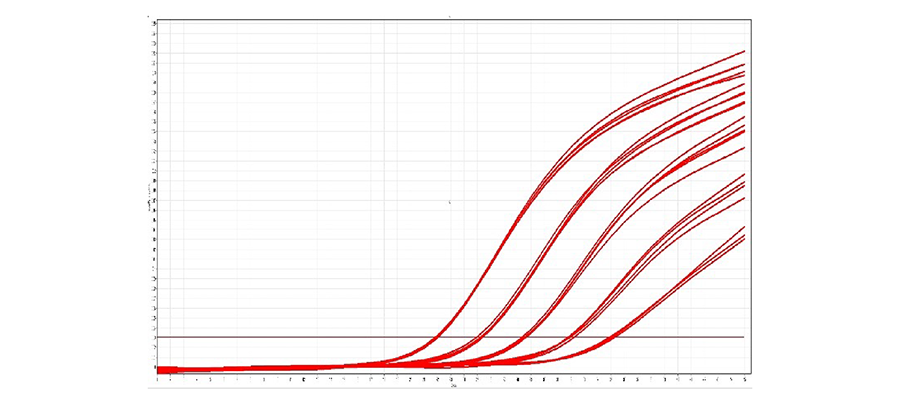Uracil DNA Glycosylase
Uracil DNA Glycosylase (UDG) is an enzyme used to eliminate carryover polymerase chain reaction (PCR) products in qPCR and RT-qPCR. This is done by incorporating dUTP in all qPCR products, so any residual products from previous PCR amplifications will contain dUs and can be digested by pre-treating with UDG enzyme.
*Not available for sale in the United States
High efficiency and sensitivity with DNA viruses

Amplification of a 10-fold serial dilution of Parvovirus B19 from inactivated crude viral lysates was tested using Hi-throughput dUTP qPCR Mix (MDX031) and primers and probe for Parvovirus B19 and Uracil DNA Glycosylase (MDX054). Four replicated are shown in the amplification curve, illustrate the reproducibility, efficiency and sensitivity of Hi-throughput dUTP qPCR Mix.
Uracil DNA Glycosylase, MDX054
Used to eliminate carryover polymerase chain reaction (PCR) products in qPCR and RT-qPCR,by incorporating dUTP in reactions, so residual products from previous PCR amplifications containing dUs can be digested.
文档与资源
Description
Uracil DNA Glycosylase (UDG) catalyzes the release of uracil from uracil-containing single or double-stranded DNA, but not from RNA or oligonucleotides (6 or fewer bases). UDG is active over a broad pH range with an optimum at pH 8.0, does not require a divalent cation, and is inhibited by high ionic strength (>200 mM).
Specifications
| Description | Uracil DNA Glycosylase (UDG) removes uracil residues from the sugar moiety of single- and double-stranded DNA without destroying the phosphodiester backbone, preventing its use as a hybridization target or as a template for DNA polymerases. UDG will not remove uracil from RNA. |
| Concentration | Uracil DNA Glycosylase, MDX054 = 1 U/µL in 50% glycerol |
| Unit Definition | One unit is the amount of enzyme that catalyses the release of 60 pmol of uracil per minute from double stranded, uracil-containing DNA. Activity was measured by release of [3H]-uracil in a 50 µL reaction mix containing 0.2 mg DNA (104-105 cpm/mg) in 30 minutes at 37 °C. |
| Source | MDX054 is recombinant E. coli strains carrying the over-expressed modified gene of Uracil DNA Glycosylase. |
| Format | Clear, colorless solution |
| 10x reaction buffer | 0.25 M Tris-Cl, 1 mM EDTA, 10 mM DTT, pH 8.0. |
| Application | High throughput, PCR, qPCR |
| Sample type | cDNA, DNA |
| Presentation | 2 vials |
| Storage | -20 °C |
| Mix stability | See outer label |
| Functionality | dUTP PCR products are degraded on the addition of UDGase to give single, distinct bands on an agarose gel. |
| DNA Contamination | None detected in PCR amplification with traces overlay with the negative control on E. coli and mouse genomic DNA specific targets. |
| DNase Contamination | No detectable degradation |
产品资料
开发常温稳定检测的分子试剂开发常温稳定检测的分子试剂
低 LOD 1 步 RT-qPCR 混合液低 LOD 1 步 RT-qPCR 混合液
FAQs: Uracil DNA Glycosylase
During PCR, misincorporation of uracil during DNA synthesis or spontaneous cytosine deamination in the DNA strand can occur. UDG enzyme catalyzes the excision of uracil nucleobases (dUTPs) to prevent mutagenesis, allowing for targeted, more reliable PCR assays.
UDG refers to a superfamily of enzymes that includes family I UDG enzyme called UNG, after the uracil-N-glycosylase gene, so the terms UDG enzyme (UDGase) and UNG enzyme are commonly used interchangeably because they perform the same function in qPCR, by preventing carryover contamination.
Uracil DNA Glycosylase (UDG) catalyzes the release of uracil from uracil-containing single or double-stranded DNA, but not from RNA or oligonucleotides (6 or fewer bases).
UDG is active over a broad pH range with an optimum at pH 8.0, does not require a divalent cation, and is inhibited by high ionic strength (>200 mM).
The UDG enzyme has activity below 55°C, so this should be the minimum annealing temperature for qPCR amplification, to avoid degradation of newly synthesized dU-containing qPCR products.
Uracil DNA Glycosylase is tested for purity (run on SDS-PAGE gel), presence and absence of endonucleases, nickases, exonucleases and RNases.
The Uracil DNA Glycosylase is sourced from a recombinant E. coli strain carrying the over-expressed modified UDG gene.
与我们的专业团队联系
想了解更多迈迪安免疫和分子产品信息?欢迎与我们联系